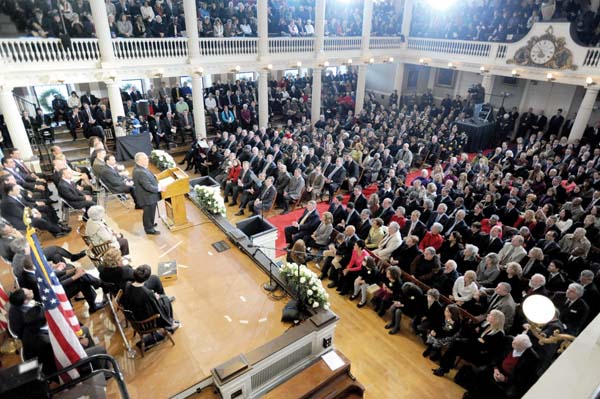January 7, 2010
 Mayor Menino took to the lectern at Faneuil Hall on Monday to deliver his fifth inaugural address to a full house. City of Boston photo
Mayor Menino took to the lectern at Faneuil Hall on Monday to deliver his fifth inaugural address to a full house. City of Boston photo
Don’t call him the “Urban Mechanic†anymore. Mayor Thomas Menino first gained the labelbecause of his near-obsessive focus on the city’s neighborhoods and delivering city services.
“The nickname was overstated then, but it’s outdated now,†Menino said this week, as he took the oath of office for a fifth four-year term. “We are all urban mechanics. Smart phones, GPS, wireless technology, and the resurgent spirit of civic engagement mean that all of us are eyes and ears on the streets, that neighbors are our greatest source of data, and our citizens the best civic entrepreneurs.â€
The comment was one of several written into Menino’s inaugural speech that he used in an attempt to underscore a new, innovative City Hall. But it will also be a City Hall with familiar face in charge, dealing with the familiar problems of budget constraints and battling with unions over changes to the school system.
“That’s the challenging part,†said Sam Tyler, president of a city watchdog group, the Boston Municipal Research Bureau. “Trying to implement the vision part, important changes, without the ability to spend a lot.â€
Added City Councillor At-Large John Connolly: “The overarching truth we all recognize is that we have to do the best we can in brutally difficult economic times and that will play a big role in how ambitious the city will be.â€
Having a mandate will help. Menino trounced challenger Michael Flaherty in November by 15 percent. “He is a man who has tremendous political capital,†said City Councillor At-Large Stephen Murphy, one of Menino’s allies on the City Council.
Murphy said he expects Menino to move quickly on one of the pledges in his speech: to develop part of South Boston’s waterfront, 1,000 acres that, like other areas in the city, has been hit by the recession. Menino is pushing for the area to become a “hub for knowledge workers†and a place to experiment with “alternative housing models,†such as affordable co-housing for researchers.
Standing next to the City Council he had just sworn in at Fanueil Hall, Menino also said that by April his administration will have identified two dozen programs to cut or consolidate and six programs to expand.
“I was happy to hear him say, ‘If it doesn’t work, we’re going to do something else,’†said state Rep. Marie St. Fleur, an Uphams Corner Democrat, who as a state lawmaker will vote on how much the city will receive in money from the state, known as local aid. “He’s looking at all areas.â€
But the speech, and his comments to reporters afterwards, largely focused on the education reform bill wending its way through the state Legislature. Menino, joined by Rep. St. Fleur, has been pouring pressure on lawmakers to pass a bill that includes giving him the ability to create “in-district charter schools†that the superintendent would have control over.
The legislation, which Gov. Deval Patrick wants on his desk by Jan. 14, was spurred by the potential for Massachusetts to receive $250 million in federal stimulus funds in exchange for changes such as lifting the state’s cap on charter schools. The bill is the first major change to the state’s education system since 1993.
“To those who plan to block reform, or weaken it, or stand in the way of the last few pieces, I say make no mistake: it’s not pro-union to maintain under-performing schools for their own children,†Menino said. “It’s not responsible to jeopardize $250 million. It’s not progressive to be middle of the road on education, the civil rights issue of our time. It’s certainly not right to put adult interests before kids’ needs. Politicians who would pass paper reform in place of the real thing and declare ‘Mission Accomplished’ cheat our children.â€
Tyler said Menino’s education bill push has been encouraging.
“We have a ways to go, but at least on the education side, he’s backing up strong words with strong action,†Tyler said. “I don’t know why we shouldn’t expect that in other areas.â€
Skeptics of the reform say the bill could come at the expense of collective bargaining rights of teachers. Boston Teachers Union President Richard Stutman told the State House News Service on Tuesday that lawmakers appear to believe that collective bargaining and successful schools are “mutually exclusive.â€
“We do feel that it’s quite possible and preferable to have good schools and good due process and protections, and good collective bargaining,†he said. “We don’t think education improves with the loss of collective bargaining rights. Any attempt to weaken collective bargaining is not seen by our members as a way of strengthening education.â€
City Council President Michael Ross has his own ideas for improving the city’s education system. He said he’ll be taking colleagues to New York’s Harlem neighborhood to view improvements to that school district.
“This is an opportunity for us to learn about how it’s worked,†Ross said, pointing to a similar trip he and council members took to New York in order to improve Boston Common. “That lesson, of learning from another city, can be very helpful to us.
Topics:


